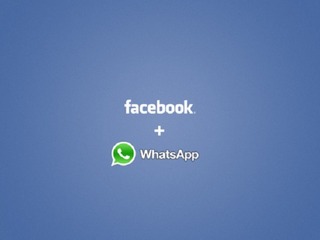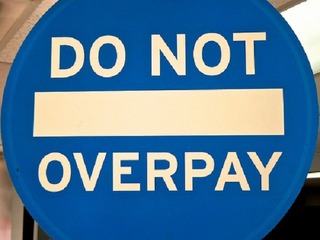
From in-app purchases to charging for voice calls, but advertising is out

For many, the most troubling part of the Facebook/WhatsApp deal is not that the deal doesn't make sense. On one hand, you have the fastest growing mobile startup with nearly half-a-billion users, and counting and on the other, you have an expensive company looking to justify its price by showing it can win in mobile.
The problem is that the $19 billion spent was on a company whose user base and potential revenue per use may not justify the purchase price.
WhatsApp charges each user a dollar per year, but also gives the app away for the first year as well. By some estimates as many at 40% of its current user base are using it for free, and there's no guarantee that they will want to pay when the year is up.
On top of that, both Facebook and WhatsApp have made clear that monetization is not going to be a priority right now. Instead they are going to focus on growing WhatsApp's user base first, and then worry about monetization some time down the road.
As you might imagine, this is not sitting well with some people, especially those who have capital tied up in the company.
While Facebook doesn't seem to be too concerned with the matter currently, we thought it would be good if we took a look at the different ways that WhatsApp could potentially monetize down the road.
There are essentially three different methods that WhatsApp can make money, and the company has already ruled one of them out.
- Advertising
I've talked to a lot of people in the advertising space, and they all acknowledge one thing: if done wrong, advertising can be a disaster. It can be intrusive, obstructive, annoying and can really turn people off. In fact, many people have an almost Pavlovian aversion to advertising because of how many times they have been burned by it.
If done right, though, advertising can be a great boon. So, for example, a native advertisement - an ad relevant to the context - could be an in-game advertisement for other games for the same publisher. The point is that the ads don't become intrusive and annoy people, like banner ads and display ads sometimes can.
Could these types of ads work on WhatsApp? I don't see why not. It might be difficult to incorporate them, but it certainly would not be impossible. We will likely never find out how it could be done, though, because Jan Koum, WhatsApp co-founder and CEO, has already made his displeasure over advertising known in the past.
In a 2012 he wrote blog post, railing against the use of ads online, saying, “When we sat down to start our own thing together three years ago we wanted to make something that wasn’t just another ad clearinghouse. We wanted to spend our time building a service people wanted to use because it worked and saved them money and made their lives better in a small way."
"We knew that we could charge people directly if we could do all those things. We knew we could do what most people aim to do every day: avoid ads."
So I think that it's safe to assume that potential revenue line is out.
- In-app purchases
The second way that WhatsApp could make money is by either selling things within the app itself, or even giving people a chance to buy third-party goods from within WhatsApp. It's a business model that has worked wonders for others in the space.
For example, the company could take the same track as Japanese mobile messaging platform Line, which offers both games and emoji, or stickers, that customers can purchase and use to communicate with one another as well as personalize their user profiles.
Line's revenue in the last three months of 2013 was 12.2 billion yen or $119 million, an increase of more than fivefold from a year earlier. Roughly 60% of that revenue came from its games, while another 20% came from sticker sales.
The company has been growing very quickly and is now worth $15 billion.
WhatsApp could also take the track laid out by WeChat, which is the dominant messaging platform in China, aka the only major market where WhatsApp does not have a presence.
WeChat also makes the majority of its money from games and stickers,
Tencent makes most of its money selling customers virtual goods. The company is projected to make 6.8 billion Yuan, or $1.1 billion this year and 9.6 billion Yuan next year. About 85% of the money that Internet giant Tencent, WeChat's parent company, will make will come from gaming.
There is another interesting way that Tencent was able to make money off the app, though.
For the Chinese, November 11th is known as "Single's Day." It serves as almost an anti-Valentine's Day, in which bachelors get to, you know, celebrate being single. In November, Chinese shopping giant Alibaba saw 35.19 billion yuan, the equivalent to $5.78 billion, breaking the record for the biggest single day of sales in history.
Tencent made over 500 million Yuan that day, or over $81 million, by allowing customers to view, and then order, products available on Tencent's 51buy website through WeChat’s menus.
WeChat has 300 million monthly active users, less than WhatsApp's 450 million, so there could be a huge potential profit for Facebook if it could find a way to sell goods directly through the app in the same way.
- Fees for features
Another track that WhatsApp could take is to model itself after Skype.
Skype offers voice calls, video calls and group calls for free as long as they are Skype-to-Skype, even on mobile. It also gives away free instant messaging, sharing screens and file sending.
The way the company makes money is by charging small fees for other services, like making calls or texting to mobile and landline phones.
Koum has already said that he will be adding voice calls to WhatsApp services. Though he said that they will be free, it is easy to see the company one day doing what Skype does: making them free to other WhatsApp users, but charge to send messages or call those that do not have the app.
There is a lot of money to potentially be made. Skype, which has at least 300 million connected users, was reportedly close to generating $2 billion in annual sales last year.
Ultimately, Facebook and WhatsApp may choose to do both in-app purchases, as well as extra features. Added together, on top of WhatsApp's existing subscription fee, and Facebook may be able to turn this purchase into a winner after all.
(Image source: paydayadvanceuk.co)
Related News


How To Cope with Your Insane Jealousy Of WhatsApp

Was WhatsApp really worth the $19 billion price?

